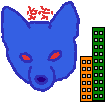SoCQ4Home Project
The SoCQ4Home project tackles the general issue of the reduction of energy consumption for buildings. Through instrumentation with numerous and various sensors, such instrumented buildings can provide a lot of information about themselves while being occupied: effective usage of rooms, thermal behavior during days and nights, etc. Instrumented buildings can also provide additional services to their users, then becoming smart buildings.
The SoCQ4Home project focuses on the monitoring of instrumented buildings with four axes:
- Middleware platform for easy deployment of sensors and sensor networks in (occupied) buildings
- Homogeneous modeling of monitoring systems to support efficient storage of heterogeneous sensor data
- Declarative query language to support multidimensional data analysis and information discovery for monitoring applications
- Declarative query language to support real-time interactions between devices and users for smart building applications
SoCQ4Home Platform
The SoCQ4Home Platform of the LIRIS Laboratory at Université de Lyon has started as a project in mid-2011. The idea of this platform comes from a previous project then dedicated to declarative query language for an easy development of pervasive applications: the SoCQ Project, started in mid-2006 with a PhD thesis. One use case of the SoCQ Project is the monitoring of instrumented buildings. For example, a monitoring application that sends alert messages when temperature exceed some thresholds could be developed with one single SoCQ query composed of about 10 lines of SQL-like clauses. Such an application takes advantage of the SoCQ Framework features like query optimization, continuous query processing, dynamic service interactions (discovery, method invocations, stream subscriptions).
In 2011, the DB group at LIRIS had been supported by the CNRS to invest in a Smart Building Monitoring platform. The SoCQ4Home Platform was initiated and progressively set up with hardware and software components, as well as a dedicated room:
- a Virtual Machine Platform to support storage of very large data (with 20To), needs for complex computation (with 12 CPU Core @ 2.66Ghz and 96Go RAM), and (less demanding) middleware deployment
- about 200 wireless sensors (including 120 energy-autonomous sensors) for various physical measurement (temperature, humidity, CO2, luminosity, presence, open/close state, acceleration)
- about 20 user-oriented devices, from simple (although wireless and energy-autonomous) switches to Smart Rabbits with camera and voice-recognition (and they can also move their ears
 )
) - a dedicated room to develop and test platform components, before live deployments
Since mid-2011, the SoCQ4Home Platform is under active development. Hardware components have been set up: the Virtual Machine Platform is actively running, and sensors and other devices are ready for a live deployment. Several software components have been and are being developed: a sensor database, a wireless sensor gateway, a Web 3D visualization interface, a Web dashboard interface. The SoCQ Engine, which is independently developed, is already able to interact with the sensor gateway to build powerful applications in a few lines of SQL-like queries.
Name(s)
The name of the platform comes from the previous and companion project SoCQ (Service-oriented Continuous Queries). As it is applied in the context of Smart Building, we came with the name SoCQ4Home. A tentative alternative “commercial” name is DeMon SQuIB, along with a draft of a first logo.
SoCQ4Home
Service-oriented Continuous Queries for Smart Buildings
DeMon SQuIB
Declarative Monitoring for Smart Queryable Instrumented Building
Tentative Project Logo: 



